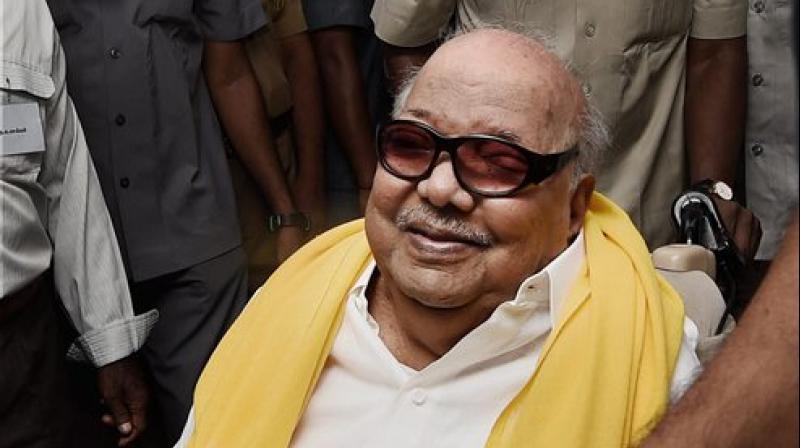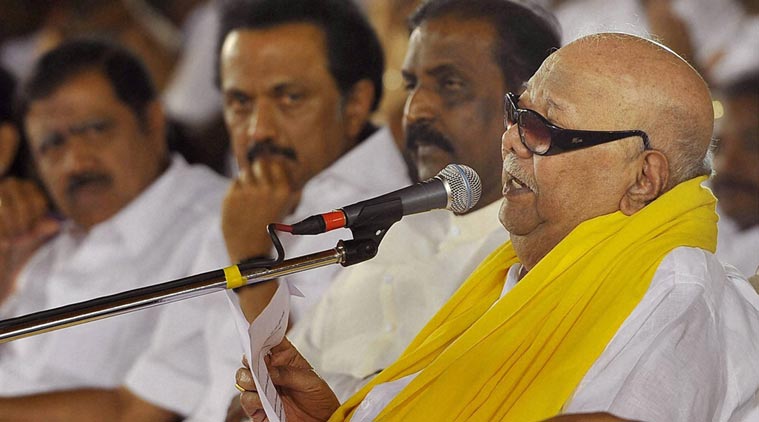The Dravidian Samurai’s Political Misses
The Dravidian political icon is a reminder of a state that had once fearlessly paved its way through Delhi’s corridors of power.

K
arunanidhi has a good sense of humour as one of his natural characteristics. Many others cited this as his secret strength that helped him pass several political hardships. However, his seriousness in political commitments lasted till a point of breaking in many occasions. Indira Gandhi appreciated this attitude by saying, “Karunanidhi is strong enough in both occasions of support and oppose”, during their re-patch in 1980. It was not surprising as the importance of what she said was evident when Karunanidhi lost the CM throne for antagonizing Emergency just four years ago.
Karunanidhi was at the fifth spot in seniority among ministers in the C N Annadurai’s cabinet when he passed away in 1969. He had to compete with the interim CM Nedunchezian for the much coveted post besides the party president post. Karunanidhi, a few years back, in a memoir mentioned that it was MGR who stood behind him to reach the throne. The party president post was also given away to him irrespective of Nedunchezian’s ambition to capture that. Party leaders feared about a personality clash between the two and decided to handover both the prime positions to Karunanidhi. The compromise formula was that the presidium post was rechristened as president and his competitor was given the post of General Secretary. Few years later it was Neduchezian who informed the press about the dismissal of MGR from the party, even though a higher level meeting concluded to postpone and patiently wait for MGR’s further moves.
Following Karunanidhi government’s dismissal, Nedunchezian joined with MGR and became minister of finance in 1980. Karunanidhi had a volatile relationship with many leaders of his party like Nedunchezian and Vaiko among others. This shows that he was not considered as an absolute leader by his detractors.
Karunanidhi’s legacy of alliance
The electoral politics of India has some wonders under its possession. One such wonder is called ‘alliance’ and ‘coalition’ governments. DMK came to power with such an inspiring collation that had both ideologically right and left parties. In 1967 assembly polls, the relatively weakened Congress, under the leadership of Kamaraj, had to face the influential regional party of DMK which had Rajaji’s Swatantra party on one side and CPI(M) on the other side. After Annadurai’s death, Karunanidhi held helm affairs of the party and decided to support Indira Gandhi post the split of the Congress from outside in Parliament. This was extended to enter into an alliance in the 1971 snap poll called by Indira. DMK did not apprehend to go with its political rival (since Indira’s faction was a part of unified Congress) either, which was admired as a shrewd move. But the result was a landslide victory for the alliance as they captured 38 out of 39 where as Kamaraj alone managed to win in Nagercoil on behalf of the Old Congress which allied with Rajaji’s Swatantra party.
Despite such a victory, DMK was not in the good books of Indira who developed some consideration towards MGR. In the 1977 post emergency election DMK managed to win only two seats. During the 1971-1976 period Karunanidhi became a votary of state rights and got the privilege of hoisting the national flag by the respective state CM’s. He even constituted a committee to look into center-state relations, under an ex Chief Justice of Madras HC, P V Rajamannar. It is still a document by a state government to look into the issue as state powers are being continuously usurped by the center even today. The other such attempt was the Anatapur Sahib Resolution passed by the Akali Dal and their supporters in Punjab in mid-seventies. Before that, DMK supported Indira’s abolition of privy purse and nationalization of banks, but did not harvest any clout with the Delhi Durbar. The same trend continued till2014, whenever DMK was in power at the center it achieved certain demands without creating any influential blocks within the apparatus.
Karunanidhi, in fact, could have become the PM in 1996 when VP Singh refused to accept the post for the second time. Finally Deve Gowda assumed it and Karnataka managed to benefit in terms of developing Bangalore as an international IT hub and blocked an amicable settlement in the Cauvery issue where TN had to completely depend on SC’s mercy.
 Not only Karunanidhi, Jayalalithaa too had missed a great opportunity to become an influential minister or even Deputy Prime Minister in Vajpayee cabinet in 1998. In the 2014 poll, she raised the slogan, ‘Modi or Lady’ which went in her favor, but she could not gain anything as the BJP gota 2/3rd majority. As a result, today the center is commanding a position against the state where it misses two political personalities.
Not only Karunanidhi, Jayalalithaa too had missed a great opportunity to become an influential minister or even Deputy Prime Minister in Vajpayee cabinet in 1998. In the 2014 poll, she raised the slogan, ‘Modi or Lady’ which went in her favor, but she could not gain anything as the BJP gota 2/3rd majority. As a result, today the center is commanding a position against the state where it misses two political personalities.
DMK’s presence in the UPA did not stop the genocide of Tamils in Sri Lanka, and till today it is considered as a set back for the party as Karunanidhi is usually called the ‘Leader of Tamil Race’(here the word Race means ethnicity). He, on the other hand became controversial as he did not go to welcome IPKF (Indian Peace Keeping Force) returning from Sri Lanka as the CM in 1990. He refused to do so citing that the force is responsible for killing fellow Tamils and the DMK was a part of V P Singh’s regime as his reason.
A developed state’s loneliness and apathy
“Tamil Nadu and Gujarat seem to be two Islands” said Indira Gandhi. It is to describe the political polarization where the influence of Congress was decimated. Though without the center’s magnanimity, the state managed to surpass several SDI parameters and placed itself in the group of higher income states, in real terms, a developed state. It does not mean that the state resolved all the outstanding issues amicably. On the other hand, it might have developed new ones. Revenue deficit is one of them and digital divide is the other one indicating its presence in the backdrop of increasing crime rate.
Besides, several agitations against various development schemes including the recent eight lane expressway from Chennai-Salem, shows the inability of the current political leadership to act impartially towards addressing the distress of the people. Karunanidhi and Jayalalithaa had such an influence among the masses to make them accept any projects of their choice.
On the political side, though, both the Dravidian parties plus MDMK hold more than 50 per cent of the popular votes in elections, their credibility is under question as the new leadership is yet to make their break-up. In the absence of Karunanidhi and Jayalaithaa, the state has to cross miles before finding a clout in the Delhi’s corridor of powers.
The current leadership has to build an atmosphere among the leading political parties and the government circles to bring in more development to the state and make them feel that the state is an inseparable part of the nation’s progress. This inclusivity phenomenon is much needed to cease the loneliness and apathy of being rejected by not only the Northern states, but also by the co-southern partners.
The legacy left by Karunanidhi (Jayalalithaa as well) might be back to square one, but it also has seedlings for starting the account afresh. The new leadership has to take into consideration past attitudes and retrieve the state to old glories similar to when the Congress under Kamaraj and others had a say in all the matters concerning with the state.
